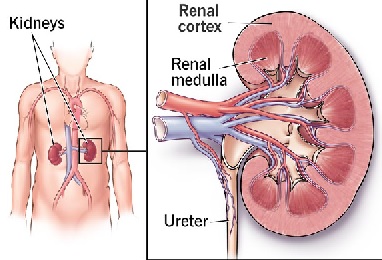World Kidney Day (WKD) 2025 was commemorated on March 13. It is a global campaign aimed at raising awareness of the importance of our kidneys. World Kidney Day returns every year.
The year-long campaign on the theme: "Are Your Kidneys OK? Detect Early, Protect Kidney Health", highlights the potentially life-changing impact of early detection and intervention in preventing and managing kidney disease.
The Ghana Kidney Association marked the day with a range of activities, including a webinar on March 13, chaired by Prof. Sampson Antwi.
It featured seasoned kidney specialists such as Prof. Vincent Boima, Dr Beatrice Nyann, Perditer Okyere, Elliot Koranteng Tannor and Edward Kwakyi.
The objectives of World Kidney Day include:
• Raising awareness about our “amazing kidneys” highlights that diabetes and high blood pressure are key risk factors for Chronic Kidney Disease (CKD).
• Encouraging systematic screening of all patients with diabetes and hypertension for CKD.
• Encouraging preventive behaviours.
• Educating all medical professionals about their key role in detecting and reducing the risk of CKD, particularly in high-risk populations.
• Stressing the important role of local and national health authorities in controlling the CKD epidemic.
• Encouraging Transplantation as a best-outcome option for kidney failure and the act of organ donation as a life-saving initiative
In achieving this objective, the Ghana Kidney Association has been conducting educational programmes and screening for kidney disease every year during WKD events.
The association has been to almost every region in Ghana to educate Ghanaians and to conduct free screening programmes for kidney disease and its risk factors. These advocacy programmes are important because the burden of chronic kidney disease is on the rise.
It is expected that in low-to-middle-income countries, the burden is at least three to four times that of high-income countries.
Again, the people affected in these countries are young, between the ages of 20 to 50 years, representing the economically productive group of our society, most of whom cannot afford the cost of dialysis or kidney transplantation.
Prevention, therefore, is the key to curtailing the rising burden of this disease.
Normally, everyone is born with two kidneys, except in certain rare situations where people are born with just one kidney.
The kidneys primarily remove toxins and waste products from the blood. Other functions of the kidneys include controlling blood pressure, maintaining healthy bones, controlling water balance, controlling acid-base balance and production of a hormone called erythropoietin, which plays a key role in the formation of red blood cells.
In addition, the kidneys ensure that certain key minerals in the body, such as potassium, sodium, phosphorus, magnesium, calcium and others are all maintained in the right balance for the body to function well.
Kidney failure, thus causes serious problems for affected individuals.
Globally, kidney diseases afflict over 700 million people and account for 1.2 million deaths annually. Kidney diseases are wreaking havoc in low and middle-income countries where both the prevalence and death rates are significantly higher than in high-income countries.
The prevalence of CKD in Ghana is estimated to be about 13.3 per cent, translating to about four million Ghanaians living with CKD.
The Ghanaian media (radio, television, newspapers) and social media are inundated daily, with people seeking help as they battle kidney diseases, usually in the prime of their lives.
The recent brouhaha over dialysis issues lends additional credence to putting the spotlight on kidney diseases. This goes to support the fact that CKD is a major public health problem in Ghana.
Hypertension (high blood pressure) and diabetes (uncontrolled blood sugar) are the two main causes of kidney failure worldwide.
Other factors that increase the risk for kidney disease include obesity, cardiovascular diseases, smoking, family history, allergic reactions, abuse of certain prescribed medications and herbal concoctions, severe dehydration, insufficient blood flow to the kidneys and some infections such as HIV and Hepatitis B and C.
In addition, certain environmental factors such as toxins from heavy metals and pesticides, as well as underground water with high fluoride levels, have been noted to cause kidney disease.
The adoption of Western lifestyles, which comes with changes in diet, less physical activity, rapid urbanisation and an ageing population due to relative improvement in the health care system, have been blamed for this sharp rise in CKD.
At the early stages of kidney failure, there are no noticeable symptoms. This is worrying for countries like Ghana, where people hardly go for regular medical checkups.
As a result, kidney problems are detected when they are in their advanced stages.
People with kidney failure present with symptoms such as decreased urine production, swollen legs and feet due to fluid retention, shortness of breath, excessive fatigue, chest pain, trouble sleeping (insomnia), decreased appetite, nausea, vomiting, itchy skin, muscle cramps, confusion, seizures and coma.
At this stage, they will need renal replacement therapy to survive. I will conclude next week.
The writer is a member of the Paediatric Society of Ghana and the Director of Medical Affairs, Korle Bu Teaching Hospital.
astom2@yahoo.com

